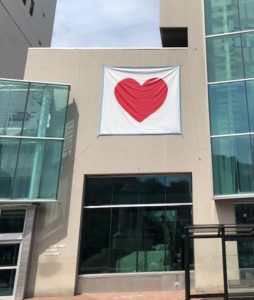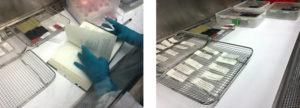Maine Voices: Portland Public Library committed to welcoming you back safely
posted: , by Heather Wasklewicztags: Adults | Teens | Parents & Teachers | Kids & Families | Discover Portland | Seniors
BY PETER RICHARDSON AND SARAH CAMPBELL SPECIAL TO THE PRESS HERALD

We’re offering a popular no-contact pickup service, we’re seeking submissions for a COVID archive and we’ll soon eliminate overdue fines.
It has been more than 120 days since Portland Public Library closed our doors along with so many others, and we miss you. At an average of 1,500 visits per day, that is 180,000 times when we didn’t get to say hello, see eager smiles over an exciting pile of good reads, hear kids playing along with songs and rhymes, welcome teens to gather after a day at school, convene community conversations about key issues, share intimate access to prominent authors and host all of the reasons people choose to be in an inspiring, diverse, respectful and caring shared space, where they belong and can find answers to their individual quests.
These days, a sense of “belonging” is a big concept, a more loaded word than before our recent period of crisis and determination. “Belonging” was already an emerging term for diversity before the pandemic and the latest killings of Black community members. “Belonging” favors a person’s feelings instead of an organization’s or individual’s intentions.
The library provides a haven for belonging, because we believe in a social contract. Here, everything is shared, with respect for one another and respect without judgment for the many reasons people search for information, inspiration and entertainment. Libraries invest in the power of access to ideas and conversation about those ideas, to grow knowledge, context, understanding and, ultimately, the creation of new ideas. These principles are why librarians are the (second) most trusted profession according to recent research. (Nurses are first, of course!)
During this period, our creative staff have offered more than 150 virtual programs: storytelling and how-to activities for kids, resource workshops for small businesses and our outstanding Maine author and expert talks captured on our YouTube channel. Now, we are underway re-establishing in-person services in concert with the best-practice state guidelines.
It’s been 60 days since we started PPL-To-Go, our curbside equivalent of a gourmet meal for the brain and spirit. Neighbors are poring over 4,000 items you were craving during the prior four months! Now you can send an email to the Your Next (Great!) Read staff for a personalized list of titles to match your preferences, while kids, teens, families and caregivers can get the same service by emailing Your Next (Great!) Read^ Junior. We hear from our patrons how reading is healing these days, and we agree. We are also participating in a statewide archive project, Portland Contemporary Archive (formerly Isolating Together), where you can document and preserve your experiences during the pandemic for future historians to explore.
In the coming weeks, we will restart access to public computers. With safety precautions and new cleaning protocols, it will look different from our traditional technology hub. Still, it will fill a gap for our neighbors with limited access to the internet and needed devices.
When our schools reopen in whatever form it must take, the library is poised to build on our long partnership with Portland Public Schools to support and supplement educational goals with activities, resources and passion toward learning, from pre-K through teens.
Starting Sept. 1, we are proud to join the growing national cohort of public libraries to eliminate overdue fees. Increasingly, research shows that while people are equal in returning books after the due date, they are not equal in their ability to pay overdue fees and thus lose access to the library. This disproportionately harms people of color and people from lower-income households. We believe this policy change is essential to build a more equitable society.
We love you, dear Portland. We all are changed by recent events, we continue to change, to recover and to build new, and we must embrace the change together. We miss you and miss being the community hive for stimulating, delightful, eye-opening and perhaps even controversial choices. A library belongs to the community, its community of communities, and we will continue to re-establish this library, safely and sustainably, as the place where you belong.

